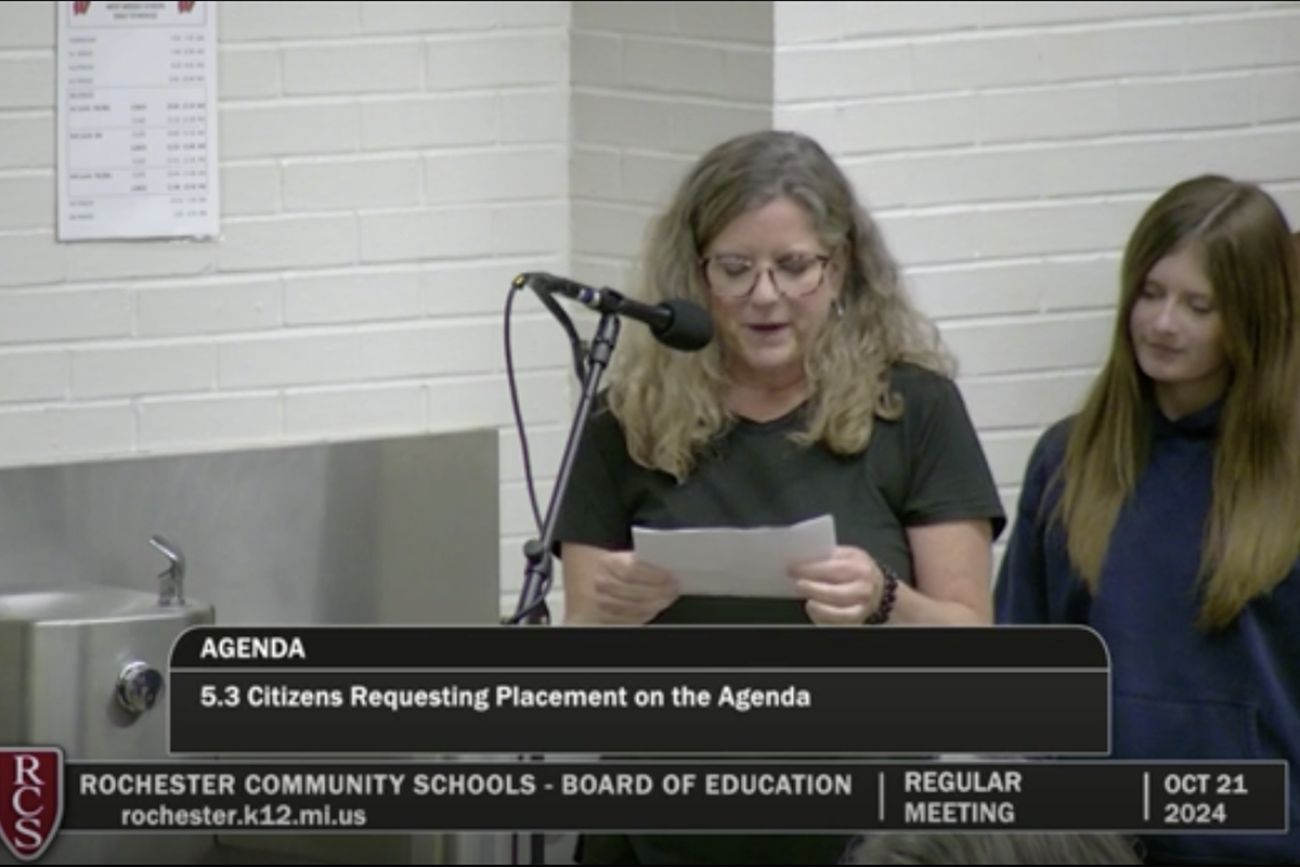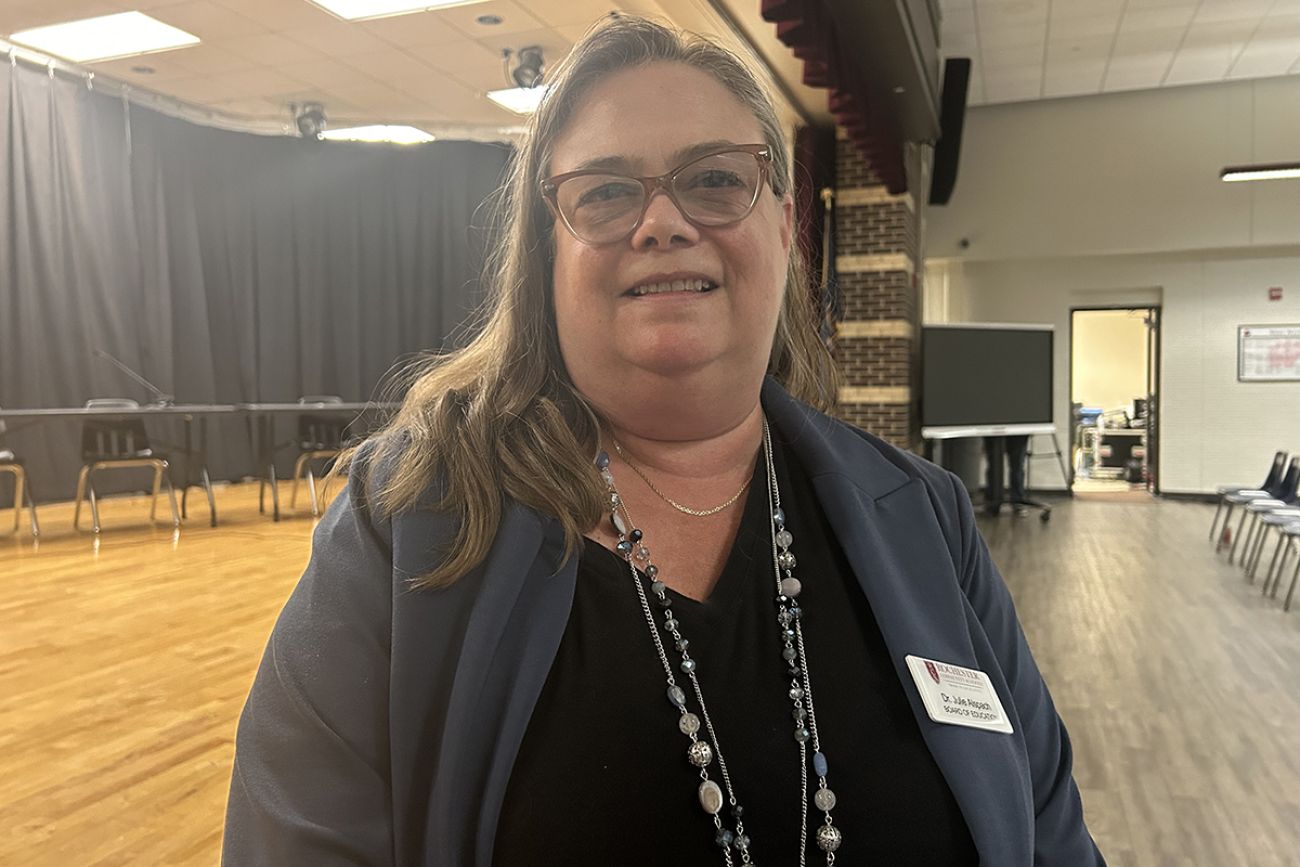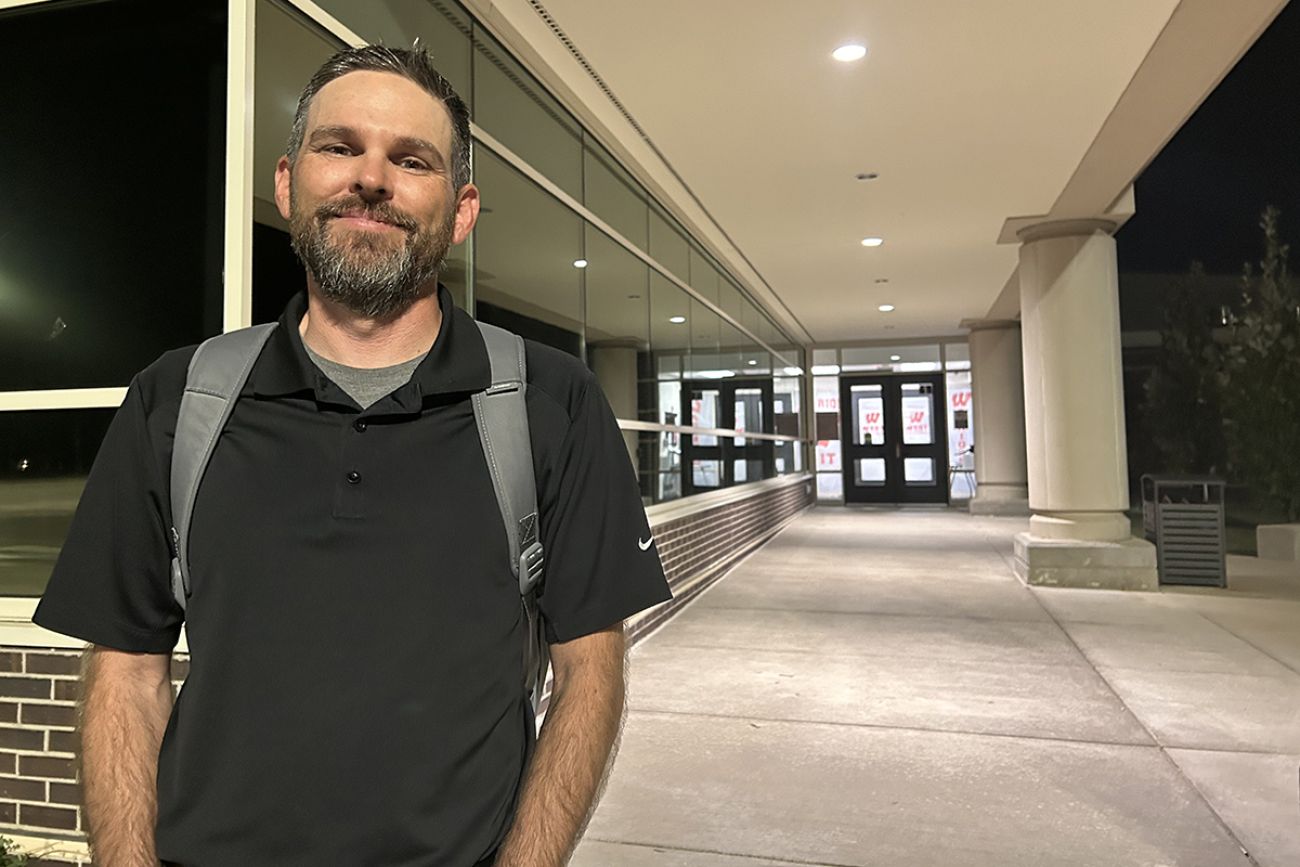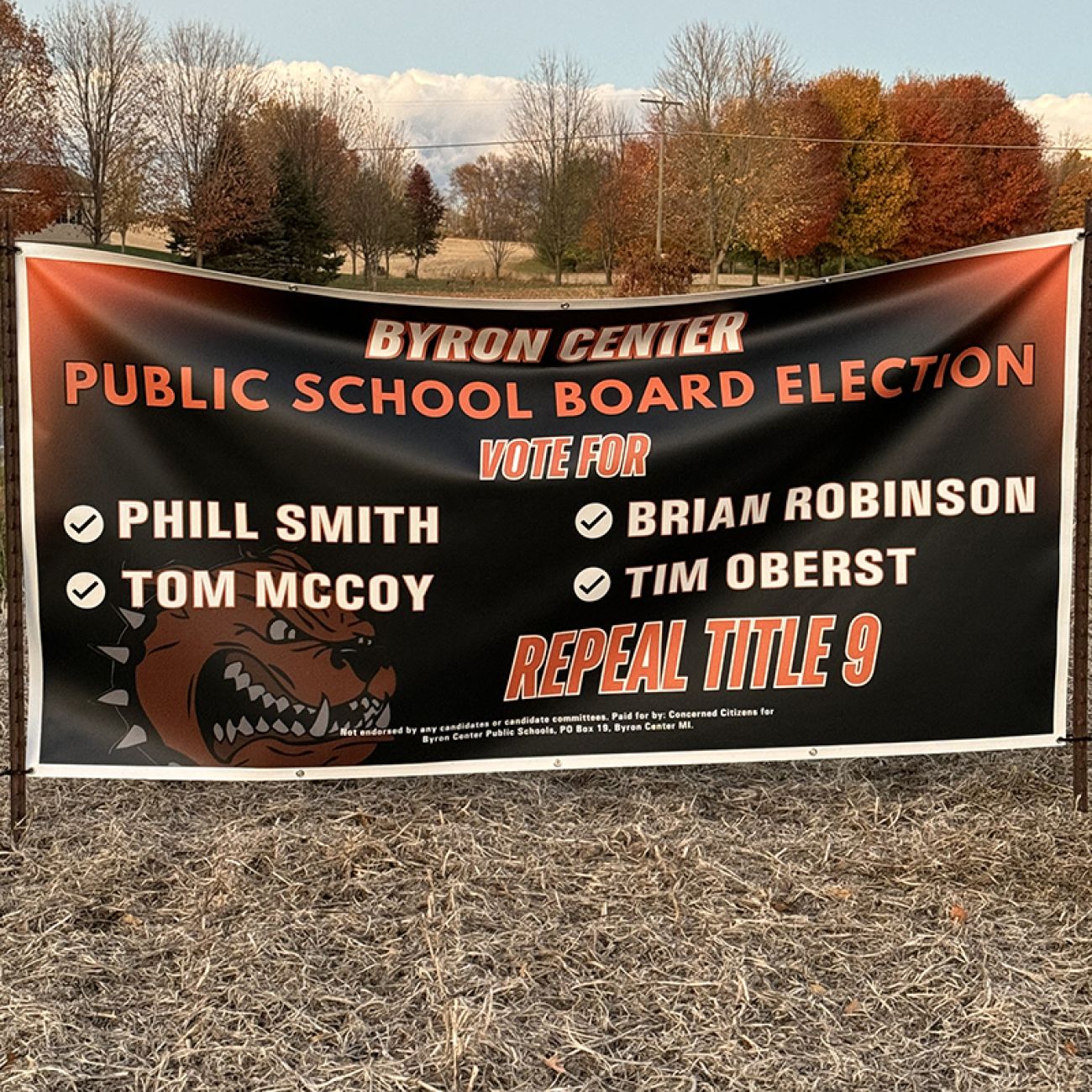Trans rights fight returns as wedge in Michigan elections

- Parental rights groups have a new issue during the election: Title IX
- New protections for transgender students are in legal limbo across Michigan and the country
- There are roughly 1,550 school board seats up for election in Michigan
ROCHESTER — Kristi Fleming and six high school girls marched up to a microphone last week to make the case for bathroom regulations.
"You're putting these girls at risk," Fleming, a parent to one of the girls, told members of the Rochester Community Schools board, where a debate over LGBTQ rights is roiling the community in an already tense election year.
The district needs to enforce clear sex-based distinctions for locker rooms and bathrooms while having unisex places to accommodate students, Fleming said, arguing transgender students "deserve equal rights, but not extra rights."

But Karen Hernacki, another parent, urged the board to finalize a policy that will protect LGBTQ students who are already called “slurs in schools regularly.”
“It is very hurtful and the mental health is just declining rapidly,” she said. “I see my children's friends dealing with this and I am really scared that if we keep dragging these children into our school board meetings, dragging their names out into public, we are going to lose a kid.”
Related:
- In Michigan, voters sour on school bonds. Once an easy sell, half now fail
- Five things to know about Michigan school bond proposals this election
- Trump wants to abolish the Department of Education. Is Michigan ready?
Two years after COVID-19 restrictions prompted a wave of contentious school board elections, advocates for parental rights are now challenging LGBTQ anti-discrimination policies through local elections and court filings.
The contentious wedge issue has re-emerged on the national stage as well, with Republican presidential nominee Donald Trump spending millions on anti-trans advertisements. Some other conservative candidates for statewide office, including in Michigan, have followed suit.
At issue is Title IX, a federal law that offers protection from sex discrimination in K-12 schools and colleges.
In August, Democratic President Joe Biden’s administration expanded the protections to include sexual orientation and gender identity. But a legal battle means some Michigan schools are still operating under previous Title IX regulations, while others are expected to adopt the 2024 rules.
The state has its own guidance about LGBTQ students, and lawmakers recently amended the state's civil rights law to prohibit discrimination against people based on gender identity and sexual orientation.
It’s a complicated legal environment that has proved a flashpoint in some communities. In Rochester, where voters will select five school board members in Tuesday’s election, parents are calling on the district to provide clarity on its practices for where transgender students can use the bathroom.
Elsewhere, school board candidates in Byron Center are explicitly running to overturn the Title IX policy. And conservative lawsuits target LGBTQ rights at schools in Forest Hills, Walled Lake and more.
The long-running dispute came to a head last week during a nearly five-hour school board meeting in Rochester, a district plagued by other scandals in recent years after collecting information on parents critical of COVID-19 policies, a controversial field trip and litigation over parent access to classroom materials.
“I think that when I go out and I knock on doors, it’s not the same issues as you see here,” Rochester school board member Julie Alspach, who was appointed to the board last year and is running for election, told Bridge Michigan.

There are roughly 1,550 school board seats open across the state up for election next week, according to Don Wotruba at the Michigan Association of School Boards. Trina Tocco, director of the Michigan Education Justice Coalition, estimates there are about 2,300 candidates for those seats.
Wotruba said he’s been surprised by the amount of money being spent on school board elections this year, but hasn’t necessarily seen Title IX as a major issue in each race.
“The ultimate arbitrator, the ultimate decider on the education of a child (is) a parent,” said Matthew Wilk, a Republican activist and leader of Get Kids Back to School, Inc., a group working to get about 90 “parents-first” candidates elected across Michigan.
“It is not the school. They don't know better, they don't know best.”
A campaign talking point
On the national level, Trump is heavily investing advertising dollars about transgender athletes and inmates.
His campaign has spent more than $29 million on anti-transgender television advertising in battleground states — including Michigan — per AdImpact, a software company that provides real time advertising data. As of Oct. 16, CBS News reports those ads have aired more than 55,000 times across the country.
While Trump and other candidates have lambasted policies that allow transgender students to participate in sports, it's a relatively minor issue in Michigan, where only a handful of students seek waivers each year.
“It’s a distraction from the topics that are really top of mind for just average people,” said Delphine Luneau, deputy communications director for the Human Rights Campaign, a national LGBTQ advocacy group based in Washington.
Mike Rogers, a Michigan Republican running for US Senate, has also raised the issue, arguing Democratic rival Elissa Slotkin is “too radical” for Michigan and is “forcing our daughters to play sports against biological males.”
A 30-second ad from Rogers also accuses Slotkin of “voting to let men use girls’ locker rooms.”
But the bill in question — which Slotkin did not write, but cosponsored — deals with barring discrimination or segregation on the basis of sex, sexual orientation and gender identity — legislation similar to what Michigan adopted last year expanding its own Elliott-Larsen Civil Rights Act.
The focus on transgender Americans isn’t necessarily new, though Luneau said it has ramped up in recent years. In 2022, the issue was one of the major talking points for Republican gubernatorial candidate Tudor Dixon, who lost to Democratic Gov. Gretchen Whitmer by roughly 10 percentage points.
Local fights
How schools accommodate transgender students and the policies that govern those decisions continue to play out at local meetings and courtrooms.
In Rochester, where five board seats are up for election, Superintendent Nicholas Russo this week defended local policy by saying the district is following federal and state law.
But it's still a "major issue for voters," said school board member Andrew Weaver, adding that the issue of Title IX and bathroom accommodations “hits very personal to a lot of people."

Liz Schroeck, president of the Rochester Education Association union, disputed Weaver's claims that the policy is leaving teachers in the lurch.
“Andrew Weaver represents a small but very vocal group of political extremists, and they're, I believe, using the Title IX issue, I think they've created it, and they're following kind of like a larger group playbook,” Schroeck said.
In west Michigan, opposition to Title IX is the “only issue” a slate of school board members is running on in Byron Center, said resident Sarah Williams.
At an October meeting, several community members referenced their Christian faith and called upon the district to fight the Title IX rewrite.
“Title IX and the Elliot-Larsen expansion were not designed to create a utopia of peace and love,” said State Rep. Angela Rigas, an Alto Republican, “they were designed to force the people to comply with an anti-God, anti-family, evil agenda that is destroying this Christian nation from the inside out.”
District officials explained protocols for when a student says they want to go by a different name or pronoun. School board members approved a revised Title IX policy in September but later faced calls to rescind their vote.

With the election approaching, some residents are receiving mailers urging them to vote for “parent approved candidates” who will “take a stand against this dangerous agenda!”
“The highjacking of Title IX must force all Byron Center citizens to take a stand to protect our kids,” one mailer said, arguing “boys who identify as girls” will be open to girls bathrooms and others will be “forced to accept” preferred pronouns.
“I think that this whole community of people who are afraid of Title IX thinks that like RuPaul is going to kick in the doors of the high school or something, and demands things from this administration,” said Williams, the local resident who supports the LGBTQ antidiscrimination protections.
“And if the administration doesn't give it to them, they're going to file a lawsuit. Instead of thinking about the trans children who are scared, who are fearful for their lives, they just want to belong. They just want to be accepted.”
Courtroom battles
School board elections are nonpartisan but far from apolitical. Local teacher unions endorse candidates, glossy fliers appear in residents’ mailboxes and candidates are labeled as extreme.
Moms for Liberty, a national “parental rights” group, endorsed multiple candidates in 2022 but did not have great success. They’ve now turned to the courts as a plaintiff in a federal lawsuit that blocks enforcement of the new rules in many schools and states across the country.
Last month, the Great Education Initiative, a group that says it advocates for parent rights, student safety and “orthodox education,” filed a separate federal lawsuit challenging Title IX in Michigan schools.
In its complaint, the group argues that many Michigan families have deeply held religious beliefs that would be violated if someone has to use different pronouns for someone than their sex assigned at birth.
The lawsuit also references students’ fears about sharing bathrooms or locker rooms with people of a different sex.
Attorneys are asking a federal court to declare the new Title IX rule unlawful and declare the government cannot stop school districts from designating spaces such as bathrooms separated by biological sex, or require school teachers and other employees to use “preferred pronouns or honorifics.”
The lawsuit references families whose students attend Forest Hills, Thornapple Kellogg, Walled Lake and Hartland public schools.
The Great Lakes Education Project, a state group linked to former US Education Secretary Betsy DeVos, is funding efforts to elect school board candidates in some of those districts, according to a list of independent expenditures provided by executive director Beth DeShone.
Parents are generally concerned about school district transparency and accountability, DeShone said, but that Title IX concerns have added a new wrinkle to many races. Districts “still have a great deal of latitude to create a policy at their school district level that falls within the confines” of anti-discrimination laws, she added.
Make school boards boring again
Title IX policy has also been a source of division in other states. But because of ongoing litigation, 26 states are currently blocked from enforcing the new federal regulations.
In Michigan, Hartland Consolidated Schools approved a protocol in July for transgender students to have a meeting with officials and parents before using a bathroom that is different from the one aligned with their sex at birth.
In Rockford, a married couple is suing Rockford Public Schools for allegedly treating their daughter as a boy using a different name and pronouns without informing the parents. In Houghton Lake, there is an online petition calling on school board members to resign based on their decision about Title IX.
Matt DePerno, a former Republican attorney general candidate, last year sued Vicksburg Community Schools over bathroom rules. The case was recently settled out of court.
Michigan school districts have had to figure out how to apply new Title IX rules themselves, said Wilk, the conservative leader working to elect “parent-first” candidates across the state.
He argued school districts can make accommodations for students struggling with their gender identity but should not formalize a policy that allows students to just use whatever bathroom they choose without review by the district.
Alspach, one of the current Rochester board members, said she wants to see something different after the election.
“My goal is to make board meetings boring again, where this isn’t serving a political agenda and we’re not creating a narrative of decline.”
Michigan Education Watch
Michigan Education Watch is made possible by generous financial support from:
Subscribe to Michigan Education Watch
See what new members are saying about why they donated to Bridge Michigan:
- “In order for this information to be accurate and unbiased it must be underwritten by its readers, not by special interests.” - Larry S.
- “Not many other media sources report on the topics Bridge does.” - Susan B.
- “Your journalism is outstanding and rare these days.” - Mark S.
If you want to ensure the future of nonpartisan, nonprofit Michigan journalism, please become a member today. You, too, will be asked why you donated and maybe we'll feature your quote next time!







